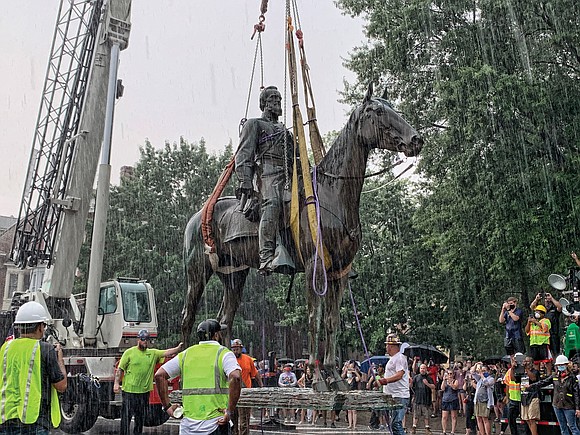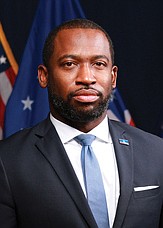No wrongdoing
Mayor Levar M. Stoney cleared in special prosecutor’s probe of the city’s awarding of $1.8 million contract to remove Confederate statues
Jeremy M. Lazarus | 8/5/2021, 6 p.m.

No bribes. No kickbacks. No evidence of corruption in the use of taxpayers’ dollars.
That’s the conclusion of a six-month probe to determine if Mayor Levar M. Stoney engaged in any wrongdoing in the award of a $1.8 million contract to a contractor to take down the city’s Confederate statues in July 2020.
The contractor, Devon Henry, had contributed to Mayor Stoney’s 2016 campaign and his One Richmond political action committee.
Special Prosecutor Timothy A. Martin made the determination after reviewing an “exceptionally thorough, impartial and professional” report from the State Police Bureau of Criminal Investigation into the contract and the mayor’s role.
Mr. Martin, who is the commonwealth’s attorney for Augusta County, issued the finding on July 28, saying the investigation found “no evidence of (an) improper benefit to the mayor as a result of awarding the removal contract to a political donor of his.”
The conclusion was not unexpected as the suspicions that were vented at the time were not supported by any evidence.
Mayor Stoney welcomed and encouraged the probe that was instigated by one of his rivals in last November’s mayoral contest, former City Councilwoman Kim B. Gray. The mayor never wavered in insisting that any probe would find that he and his administration acted properly and within the scope of their authority.
Mayor Stoney, who was not interviewed during the probe, did not comment directly on what is now a closed matter, leaving that to his personal attorney, Jeffrey Breit.
“We are pleased with the outcome,” Mr. Breit stated. He noted that Mr. Martin verified what the mayor and he had said all along.
“Mayor Stoney had nothing to do with the selection of the contractor,” Mr. Breit continued. “This was just an attempt to throw a political bullet in the middle of the campaign without a shred of evidence to support it.”
Ms. Gray pushed for the probe during her unsuccessful effort to unseat the mayor during last fall’s campaign. She could not be reached for comment on the results of the probe.
In issuing his determination, Mr. Martin sought to make it clear that his decision was based solely on the information he received from the State Police.
“I am an elected Republican from a conservative jurisdiction, and Mayor Stoney is not,” Mr. Martin stated. “I have no bias in favor of him based on some shared ideology or membership in the same political party. I have no personal relationship with him, as the two of us have never met.”
The $1.8 million contract was awarded to Mr. Henry, a Black contractor who owns and operates Team Henry, which also is part of the construction team that is to build the proposed ONE Casino + Resort if it wins support from Richmond voters in November and approval for a state license.
Mr. Martin stated that there was “an appearance of impropriety” that led to the probe. That included the fact that Mr. Henry had contributed a total of $4,000 to Mayor Stoney’s first campaign for mayor in 2016 and his One Richmond PAC; that Mr. Henry formed a separate business entity to conceal his identity; and that the large contract for the statues’ removal raised suspicions as to whether the award was handled within the bounds of the law.
Mr. Martin stated that the investigation supports Mayor Stoney’s claims that he did not suggest or insist that Team Henry get the job but left it to other members of his administration to find a contractor.
The probe also supported statements from Robert Steidel, the city’s deputy chief administrative officer, and others involved that most contractors who were contacted did not want anything to do with such a controversial project as removing the Confederate statues, Mr. Martin stated.
The investigation confirmed that every other business that was contacted rejected participation, either because they objected to taking down the statues or felt that the risk to their businesses was too great, Mr. Martin stated.
State Police investigators, he noted, also found that Mr. Henry understood the risks and created a new entity to hide his identity and that of his company to avoid protests, vandalism or other potential harms from those opposed to the statues’ removal. That “is not a crime,” Mr. Martin stated.
He also noted members of the public who contacted him were most upset that Mr. Henry received a $1.8 million sole- source contract award that was claimed to be three to six times what it should have cost. However, “taking a profit, even a very substantial one, in a transaction with the government entity is not, however, criminal,” Mr. Martin stated.
Mr. Martin also stated that he did not look into whether Mayor Stoney was entitled to use his authority as Richmond’s director of emergency management to take down the statues.
At the time the statues were removed, state and city declarations of emergency were still in force regarding the racial justice dem- onstrations that were taking place almost daily, and the mayor was empowered as director of emergency management to take whatever steps he believed were needed to deal with the situation.
Mr. Martin stated that such issues were outside the scope of his investigation.
“I was appointed to investigate this matter to find out whether the contract award was a matter of public corruption, which is incredibly serious,” he wrote. “The goal was to find out if Mr. Stoney had used public money to pay off a campaign contributor and to receive a personal or political benefit from it.
“We have uncovered no evidence of public corruption,” he summed up. “It is clear that once Richmond gained control over the monuments, especially following last year’s protests, the city was going to remove them. Therefore, the question of removal was a matter of timing. It is my decision that it would be a misuse of resources to seek charges against the mayor for what was, at worst, a removal that happened some weeks earlier than it would have.”







